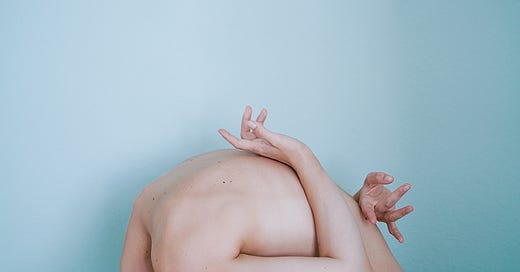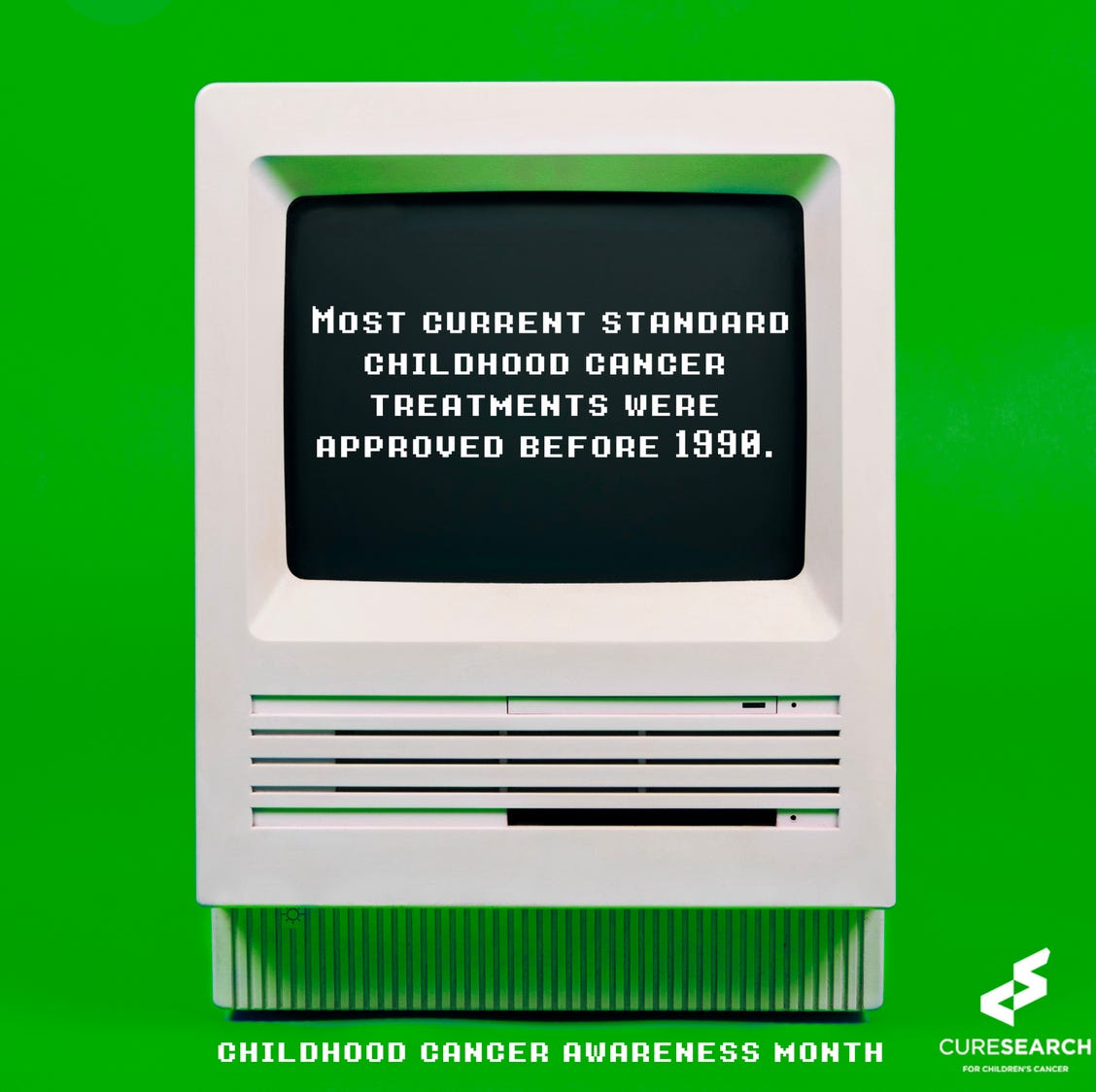Throwback Edition: I Forgot I Had a Body
Plus, how to comfort someone in distress, self-awareness in fiction has gone too far, and a case for updating childhood cancer research
Dearest Readers,
I was struck when I re-read this essay, penned at the end of tail last summer, for the similarities between the revelations shared in it and the ones I’ve uncovered lately. As you read this note I will be wrapping up one of the most silent, still months I’ve had to date. There are many, many essays to be written on the reflections this month has brought forth, and eventually I will write them, but in the mean time I leave you with this gentle reminder: everything worth discovering requires a slow down. I’ll be back in with a new edition next week.
A Note From the Editor
Many strange things have happened to me during this prolonged stretch of time that we clumsily refer to as quarantine, with the hopes of distinguishing it from that other time, before; I’ve roasted several chickens, lost my taste for incessant scrolling, and watched all three Lord of the Rings movies. But the strangest occurrence to date happened just this week — I forgot I had a body.
The melody of my days has taken up a different rhythm since March, but it used to go something like this: wake up very early, make coffee, try to keep my eyes open long enough to drum up the energy to write fiction while sitting in bed. Escape to a fictional world of my own creation right in time for my alarm to go off, signaling it was time to trek to a 7 am workout class. Complete a sweaty, efficient workout before slugging off to the office, where all that early morning energy would slowly, inevitably drain out of my body as the hours ticked on, like a lush grape drying out in the sun. By the time the grape (me) morphed into a shriveled raisin, it was time to go home, consume dinner, ignore most text messages, sleep, and repeat.
Back then I also forgot I had a body, but it didn't feel like forgetting, because how can you forget something you never really knew? There were other things I'd forgotten back then, too, and lately, they’ve been coming back to me in a slow drip, tiny spatters of knowledge arriving like an unexpected sunshower during moments of isolation or meditation.
It was during one of those moments just two days ago where this realization began to take root. I was doing yoga for the first time all year, the kind I never feel like starting because the 60 minute investment doesn’t feel like a viable return on calories burned. I was perched at the edge of the Hudson River, the balmy, dirty air of New York City flowing around me. I started off distracted, irritated, feeling self-conscious about the likelihood of onlookers watching us contort ourselves for the sake of exercise. My hamstrings resisted, my forehead wrinkled, my arms shook. I began negotiating with my body: if I breathe deeper, will you let me push a little further? If I take another sip of water, will you hold this pose for just a second longer? Eventually, I surrendered to it, and afterward, I felt refreshed, reborn.
I did yoga again the next morning, amazed by how my limbs felt like they had been plucked off some capable, carefree person who had just spent a week traipsing around Cannes and glued onto my undeserving torso. Later that day, I asked the friend who led that morning’s yoga if she wouldn’t mind walking on my back. She agreed, proceeding to dig the base of her heel into the trenches of my clenched shoulder blades while I struggled to maintain my composure beneath her, wiggling and yelping. Again, my body resisted, tensed, ached, twitched. And again, afterward, I stood up and was anew. I looked in the mirror and noticed my face was glowing, the pallid skin that had caused me to purchase a treasure trove of serums just a few days prior was miraculously radiating with vitality. I looked and felt very much alive.
Until that moment I had forgotten I have a human body that needs tending to. Growing up a dancer meant I always understood that a body required maintenance; consume only this amount of food to maintain this size, exercise at least this much if your stomach is going to be on display in that costume. Paired with society’s insistence on minimizing the female figure and my own dysmorphic predisposition brought on by a generous bottom half and a naturally muscular build, maintenance is all I ever knew. But maintenance is a loveless act.
Even though I had heretofore established more compassion in caring for my body, rejecting old habits of restriction and purging and self-hate, I was still treating it like a trophy to be polished, primed and prepped for peak performance. Now, as I type this note with loose shoulders and a bright complexion, I feel as though I’ve gained a new cognizance of this thing I live in. It needs much more than I’ve allowed myself to give, and if I am quiet enough, if I pay attention, it will tell me exactly what it is looking for. Despite the simplicity of this revelation, it feels monumental.
Cheers, my dears, and might I suggest you do something to lovingly tend to your perfect sack of bones this weekend? Lying on the floor naked, legs suspended midair? Rolling your neck ten times to each side? Whatever tickles your fancy. I’d be curious to know how you nurture your body on a regular basis, and whether those habits have changed at all during the wild ride that is 2020.
I’ll leave you with a sweet little Regina Spektor lyric that popped into my mind while writing this essay:
"I've got a perfect body, though sometimes I forget,
I've got a perfect body, cause my eyelashes catch my sweat”
Three Pieces of Content Worth Consuming
Breonna Taylor’s Life, As Told by Her Mother. You’ve probably seen this potent cover story circulating the internet this week, but if you haven’t taken the time to read it yet, you should. The story, re-told by Ta-Nehisi Coates through the words of Breonna Taylor’s mother, is not inherently framed as a tragedy, but rather a celebration of a life lived. It doesn't ask for your sympathy and it doesn't try to make you cry, and yet reading the first-hand account of the night Breonna was murdered in her own bed, about her mother’s confusion, about the full day that lapsed before she had answers from the authorities, about how Breonna came into this world and left it, was enough to make my world shake.
How to Comfort Someone When Something Bad Happens. I'm a typical advice-giving Virgo who tends to lean heavily on pragmatism, meaning my solution-oriented approach isn’t always what people need to hear when they are seeking solace. And since both the present and the foreseeable future will require comforting loved ones as they/we navigate this painful time, I found this piece to be useful. It explains the four stages of distress and goes on to suggest the best methods for comforting others as they move through the various stages. I am definitely bookmarking this for future reference.
Has Self Awareness in Fiction Gone Too Far? If you've read either of Sally Rooney's two novels (or if you've watched Normal People on Hulu), this criticism is worth the read. We’ve all become acutely familiar with a millennial skewed tendency to view self-reflection as a form of moral prowess. By this line of thought, if you contemplate your faults enough, you are absolved from them simply because you are aware they exist. This dual criticism of Rooney’s protagonists and the protagonist created by another Irish author, Naoise Dolan, explores how a glorification of self-awareness can be problematic in fiction and in life. An insightful quote from the piece:
Mocking your emotions, or expressing doubt or shame about them, doesn’t negate those emotions; castigating yourself for hypocrisy, cowardice, or racism won’t necessarily make you less hypocritical, cowardly, or racist. As the cracks in our systems become increasingly visible, the reflexivity trap casts self-awareness as a finish line, not a starting point.
Perhaps You Should… Support Modernizing Childhood Cancer Research
When one of my dearest, most creative friends told me about a campaign she was working on with CureSearch, I knew I had to include it here. Imagine relying on 1980s technology to solve modern-day challenges in 2021—that is precisley what kids with cancer are facing today. Childhood cancer treatments haven’t been updated since 1989, and CureSearch is working to accelerate the development of new and better treatments for the kids who need them most. Today is the last day of Childhood Cancer Awareness Month and perfect timing to support CureSearch in their worthwhile mission.
P.s., that creative friend I mentioned? She’s a 2021 Cannes Young Lion’s winner AND the creative mastermind behind La Mer’s latest genius viral campaign.
**Bonus Content** (AOC’s Makeup Routine)
I’ve worn makeup about four times in the past six months and I rarely care about watching others apply their makeup, but even still I watched all 18 minutes of AOC’s morning routine. Not only because I was curious to see how she manages to make herself look so flawless (natural beauty, as demonstrated above), but also because I knew any video of her speaking candidly would be overflowing with wisdom. This one doubles as a tutorial and a lesson on self-love, and I enjoyed every second of it.
A Quote From A Book You Should Read:
“He thought about the difference between good times and bad times, and how funny it was that he could not state the difference, only feel it.”
-Going After Cacciato by Tim O’Brien
This newsletter is best served with a side of conversation, so drop your opinions, reflections, and thoughts in the comments below and let’s get to talking.
Or, share the most thought-provoking piece from today’s edition with someone you love, then call them up to discuss, debate, and percolate. As a wise woman once said, “Great minds discuss ideas.”






